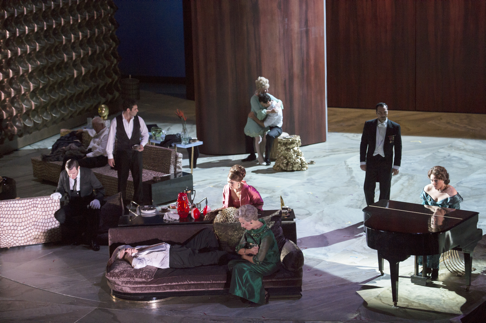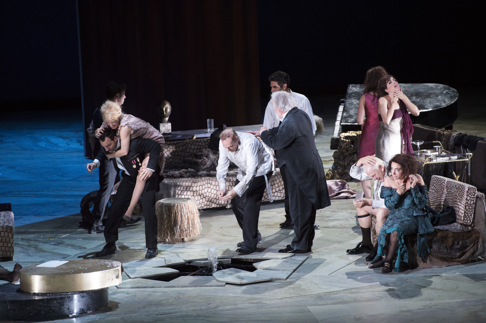05 Aug 2016
The Exterminating Angel in Salzburg
Zeitgeist or what? What Luis Bunuel's 1962 Franco era film El àngel exterminador may mean to composer Thomas Adès' 2016 opera The Exterminating Angel.

Zeitgeist or what? What Luis Bunuel's 1962 Franco era film El àngel exterminador may mean to composer Thomas Adès' 2016 opera The Exterminating Angel.
The opera is the film recast for Salzburg, Covent Garden and the Met by Adès and British stage director Tom Cairns. For Buñuel the film was gentle if macabre, humorous if macabre condemnation of Spain's Fascist bourgeoisie.
Re-worked in Salzburg the exterminating angel (an invisible presence) presides at a dinner party after an opera where its conductor's wife amuses with a (brief) piano recital and its diva is begged to sing a song by Adès. By mutual consent and compulsion no one can leave the party — for days, then weeks. Feelings fray, living conditions deteriorate. Finally the guests agree the only possible exit is to sacrifice the host. The diva has the revelation that they all now are exactly where they initially were. They leave.
 The piano recital
The piano recital
And they will be back. Like, just like the Salzburg audience. Year after year.
Adès opera is bourgeois, hook, line and sinker. Rich, beautiful music requiring everything money can buy, i.e. triple winds, huge percussion battery. Difficult music requiring extended rehearsals for orchestra and for twenty-two solo voices plus chorus and dancers. It is an undertaking only possible at institutions lavishly supported by the haute bourgeoisie. The three mentioned above are possibly the only such in existence. The ironies are blatant.
Adès inspiration is obviously complex, and finally he surely is teasing himself. And delighting in composing music that has the depth and breadth to encompass a quarrel about the size of spoon needed to stir coffee and the lengthy death of an elderly guest and then an intense love death, not to mention slaughtering a couple of lambs to avoid starvation, the cuisson of which is a lengthy discussion. The piano becomes more and more distressed, a cello is smashed, incest revealed.
 The excavation to access water
The excavation to access water
It is rich, beautiful music that can say anything, the sublime merged with the twisted, the simple with the complex. Music of Wagnerian scope and Brittenesque precision, of Buñuelian cruelty and Aristophanesque satire. It is pure Thomas Adès.
Adès somehow creates natural sounding vocal lines in surreal intervals and rhythms that explore surreal vocal ranges. The always forte orchestral score exposes extreme unidentifiable harmonies that, like Messiaen, grandly pass over or sometimes converge on beautifully inverted triads. Orchestral climaxes are sometimes hugely violent, explosive if impotent energy released. It is gratifying, very pleasurable music in service to supercilious philosophy.
As expected in Salzburg casting was exemplary, of particular note the huge vocal presence of the dinner's hostess Lucis de Nobile sung by South African soprano Amanda Echalaz, plus the freakishly high voice of American soprano Audrey Luna who squeals and squeaks the role of the opera diva Leticia. Swedish mezzo-soprano Anne Sofie von Otter sang Leonora's moving delirium and lovely if occasionally putrid prayer to the Virgin Mary. British tenor Ed Lyon and British soprano Sophie Bevan grandly intoned the love death.
The staging conceived by director Tom Cairns was adequate but not complimentary to the score, the bows (no solo bows) were excessively choreographed.
Michael Milenski
Cast and production details:
Performers: Amanda Echalaz, Audrey Luna, Anne Sofie von Otter, Sally Matthews, Christine Rice, Sophie Bevan, Charles Workman, Frédéric Antoun, David Adam Moore, Iestyn Davies, Ed Lyon, Sten Byriel, Thomas Allen, John Tomlinson, Morgan Moody, John Irvin, Franz Gürtelschmied, Rafael Fingerlos, Frances Pappas, Anna Maria Dur, Cheyne Davidson, Leonhard Radauer, Elias Karl. Sfalzburger Bachchor, ORF Radio-Symphonieorchester Wien. Conductor: Thomas Adès; Stage Director: Tom Cairns; Sets and Costumes: Hildegard Bechtler; Lighting: Jon Clark. Haus für Mozart, Salzburg, August 1, 2016.